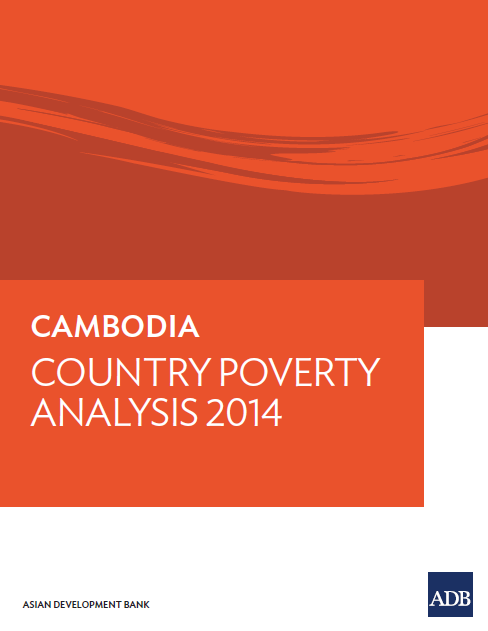
Cambodia: Country Poverty Analysis 2014
Publication Year: Asian Development Bank / Sources: 2014Income poverty has fallen dramatically, but many families teeter only just above the poverty line. With a very large share of the population concentrated at the bottom of the income distribution, the poverty rate is highly sensitive to where the line is drawn. Vulnerability to poverty has increased, and urban poverty may be rising.
Download: English | Khmer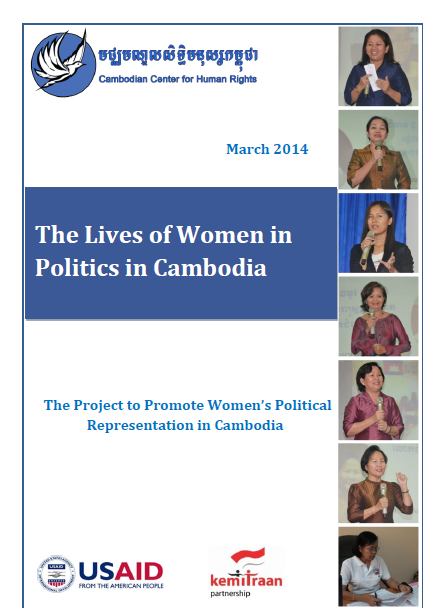
The Lives of Women in Politics in Cambodia
Publication Year: 2014 / Sources: Cambodian Center for Human RightsThis Booklet profiles women politicians who have had experiences in different political positions. It has been produced by Cambodian Center for Human Rights to promote and encourage public awareness of women’s political representation in Cambodia.
Download: English | Khmer
Law on Associations and Non-governmental Organizations
Publication Year: 2015 / Sources: National Assembly of the Kingdom of CambodiaThis law aims at safeguarding the right to freedom of establishing associations and non-governmental organizations in the Kingdom of Cambodia in order to protect their legitimate interests and to protect the public interest, as well as to promote partnership cooperation between associations and non-governmental organizations and the public authorities.
Download: English | Khmer
Democracy, Elections and Reform in Cambodia
Publication Year: 2015 / Sources: COMFRELThe Committee for Free and Fair Elections (COMFREL) in Cambodia has since 2009 extended its observations and analysis of the electoral process to include the overall process of democratization process. The analytical reports on the state of democracy titled ‘Democracy, Election and Reform’ are published annually and disseminated to all interested national and international stakeholders.
Download: English | Khmer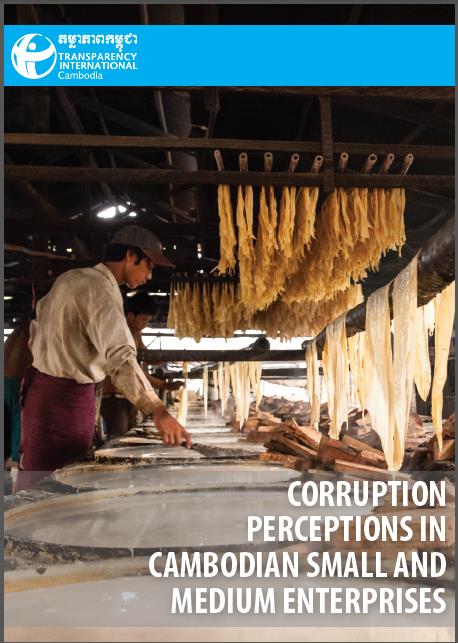
Corruption Perceptions In Cambodian Small And Medium Enterprises
Publication Year: 2015 / Sources: Transparency International CambodiaThis report (i) describes the environment in which businesses operate, (ii) identifies and analyses the different ways in which companies experience corruption and the impacts of corruption on them; (iii) assesses the reaction/response of businesses regarding corruption and the existence of specific policies or practices; and finally, (iv) contains policy recommendations on how SMEs and the Government can tackle corruption.
Download: English | Khmer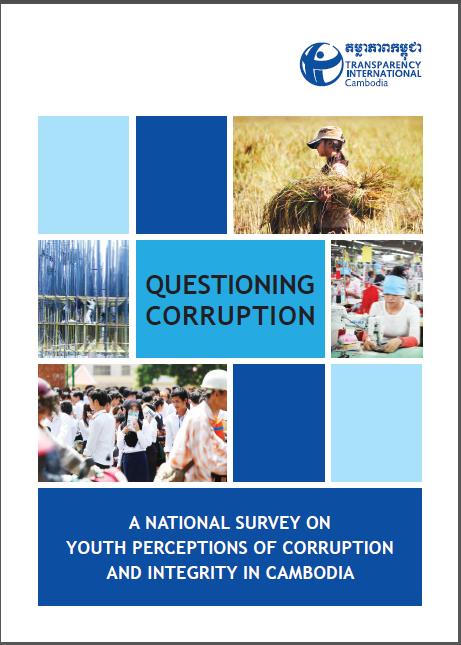
Questioning Corruption: A National Survey on Youth Perceptions of Corruption and Integrity in Cambodia
Publication Year: 2015 / Sources: Transparency International CambodiaIn Cambodia 65 per cent of the population are under the age of 30, and more than 30 per cent are youths. Consequently, ensuring youths are more engaged in society is vital for campaigns to promote integrity and eradicate corruption. The Youth Integrity Survey is designed to understand and quantify attitudes to – and perception of – integrity and corruption among this key demographic. This nationally representative survey, the first of its kind, surveyed 1,200 people aged 15 to 30 nationwide. The results can provide evidence and data to government bodies and other organisations looking to deepen their understanding of youths and identify key areas for directing anti-corruption initiatives.
Download: English | Khmer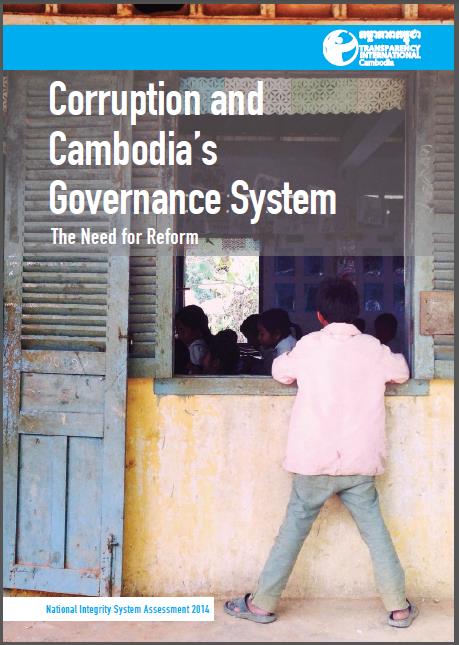
Corruption and Cambodia’s Governance System: The Need for Reform
Publication Year: 2014 / Sources: Transparency International CambodiaThe Cambodia National Integrity System Assessment provides an evaluation of the state of the country’s governance system. It assesses 13 institutions from the Judiciary to the Anti-Corruption Unit to civil society. A well-functioning National Integrity System safeguards against corruption and contributes to the larger struggle against abuse of power. Corruption undermines good governance, the rule of law, and fundamental human rights. It leads to misuse of resources, cheats citizens, harms the private sector, and distorts financial markets.Yet when governance institutions are characterised by appropriate regulations and accountable behaviour, corruption is less likely to thrive. Transparency International Cambodia has developed key policy recommendations based on the findings of this report. The recommendations, contained within, seek to engage government, donors and civil society to push forward crucial reforms to improve the integrity system. Strengthening the National Integrity System promotes better governance across all aspects of society, and, ultimately, contributes to a more just society overall.
Download: English | Khmer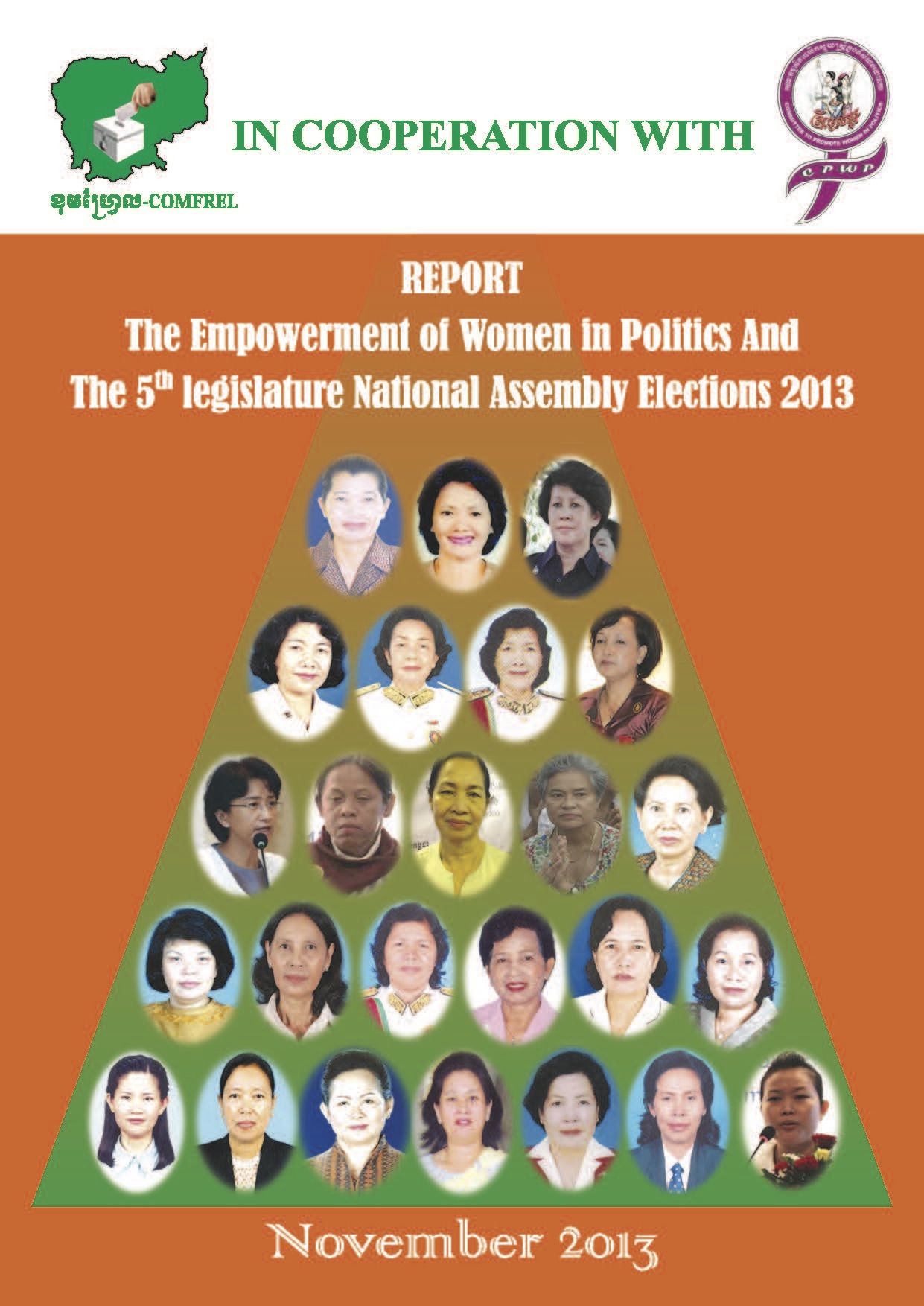
The Empowerment of Women in Politics and the 5th Legislature National Assembly Elections 2013
Publication Year: 2013 / Sources: The Committee for Free and Fair Elections in Cambodia (COMFREL)The report on “The Empowerment of Women in Politics and the 5th legislature National Assembly Elections 2013” is an analysis of the data and views of Cambodian women’s participation in politics, especially the process of the 5th legislature National Assembly (NA) Elections 2013.
This report looks in particular at the women’s political empowerment and elections; number of women candidates, number of elected women, policies of political parties for promoting women’s political participation, political party platforms on women’s and children’s issues, problems and challenges facing women both as voters and candidates, women’s opinions on electoral progress, and activities related to promoting women’s participation in politics.
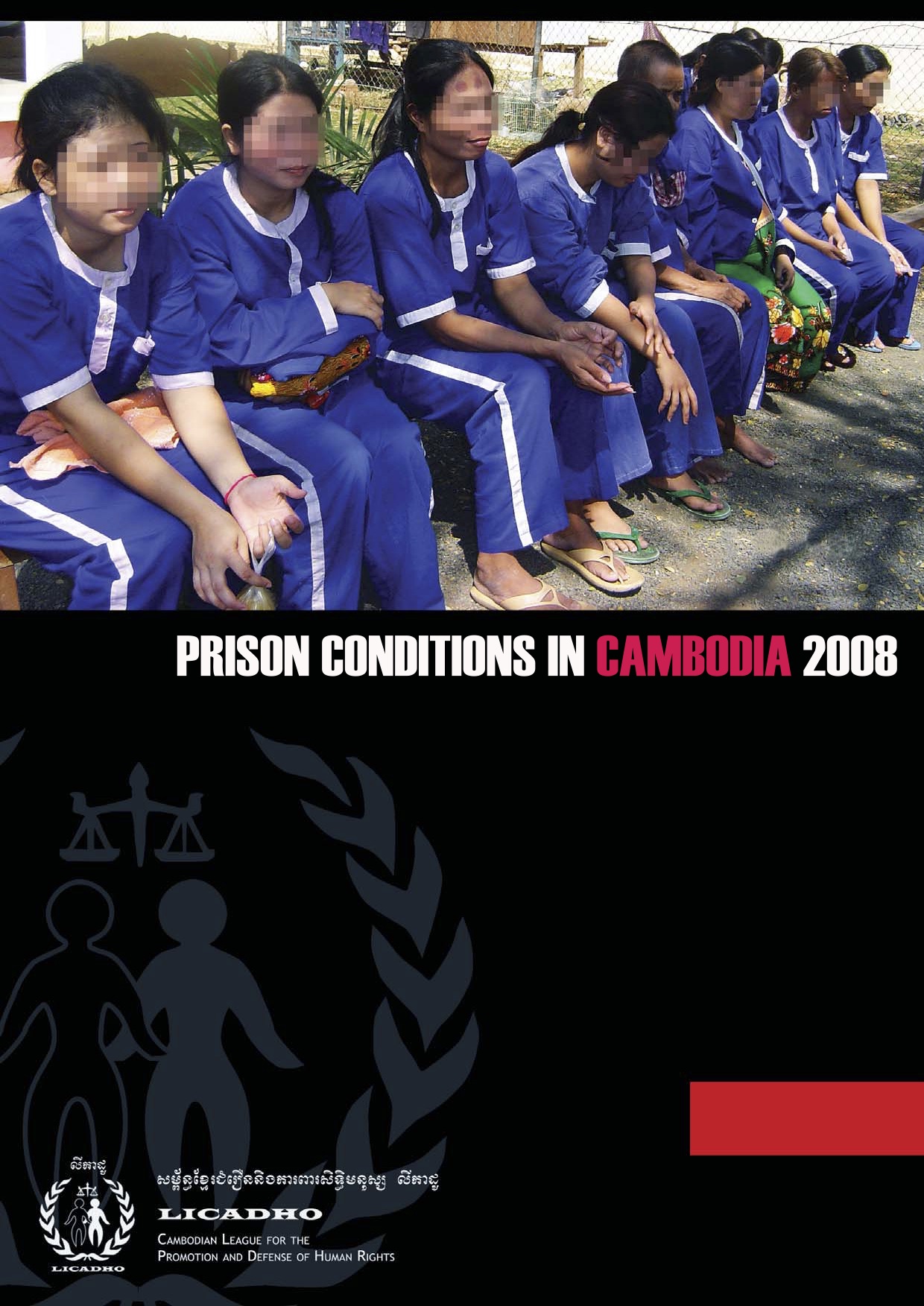
Prison Conditions in Cambodia 2008
Publication Year: 2009 / Sources: LICADHOLICADHO’s past two prison conditions reports have profiled the living conditions faced by male prisoners and mothers living with their children in prison. This report aims to profile female prisoners and their experiences in the prison system and to provide an insight into the crimes they committed and the conditions they live in. Each case study is based on true accounts from prisoners, where names and details have been changed to protect the identity of the prisoners. This report also provides supplementary statistical information for relevant issues collected over the period 2007 and 2008.
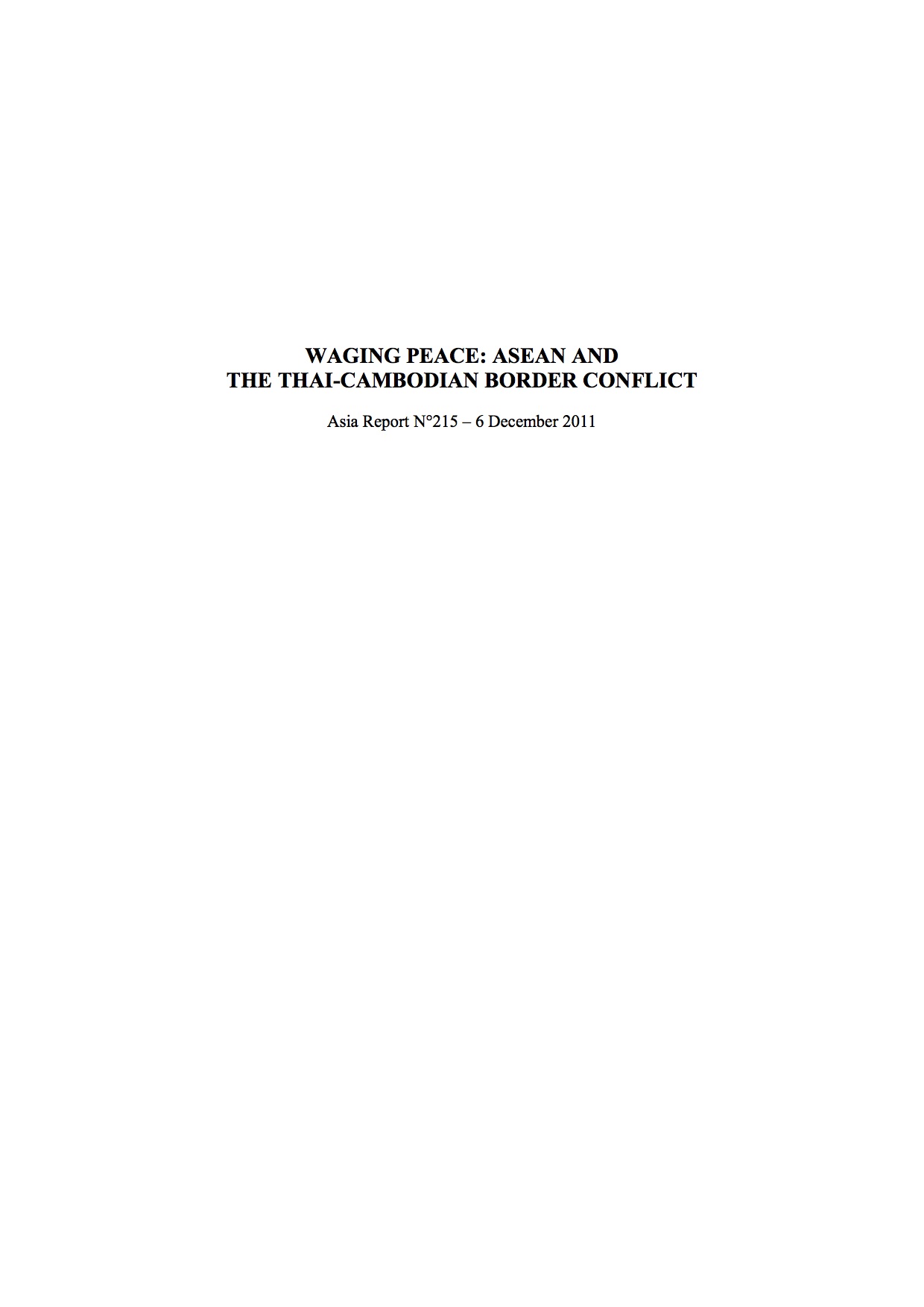
Waging Peace: ASEAN and the Thai-Cambodian Border Conflict
Publication Year: 2011 / Sources: Asia ReportBorder clashes between Thailand and Cambodia that caused dozens of casualties and displaced thousands have challenged the Association of South East Asian Nations (ASEAN) to finally turn its rhetoric on peace and security into action. Cambodia’s successful attempt to list the Preah Vihear temple as a World Heritage Site came against the backdrop of turmoil in Thai politics after the 2006 coup that deposed Prime Minister Thaksin Shinawatra. Thai pro-establishment movements used this issue to whip up nationalist sentiments against Cambodia as they tried to topple the Thaksin-backed government. The emotionally- charged campaigns halted border demarcation and sparked a bilateral conflict. In early 2011, the dispute turned into the most violent clash yet between ASEAN’s members, testing its historical commitment to non-aggression and prompting it to get involved. This has raised expectations that it might live up to its stated aspiration to keep peace in its own region. As yet, however, while its engagement set important precedents, it has no significant achievements. More robust diplomacy and leadership are still needed.
